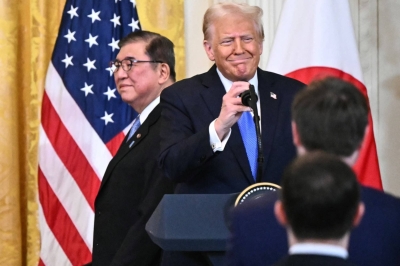On Dec. 18, 1956, on a freezing winter's day, the ceremony for Japan's admission into the U.N. was held at the U.N. General Assembly in New York. Witnessing the ceremony, I felt the sincerity and warmth of other nations in remarks made by representatives of the countries that welcomed Japan's return to the international community. It was something more than just a feeling of celebration; then-Foreign Minister Mamoru Shigemitsu's halting speech on the occasion was filled with joy and pride on Japan's return to the international community.
Reflecting on Japan's past actions with great remorse, Shigemitsu strongly asserted Japan's determination to take an honorable position in the international community. As a country that had renounced war and the use of force, it was a natural choice for Japan to strengthen the U.N. to protect itself from wars and conflicts and promote international peace. But at the same time, it cannot be denied that Shigemitsu's speech also included some remarks hinting at over-idealism, which had grown in the 23 years following Japan's withdrawal from the League of Nations in 1933 and passive attitude toward peacemaking, stemming from the fact that Japan was under the U.S. protection.
Japanese diplomats were excellent, and what they achieved at the U.N. was remarkable and worthy of closer attention, even shortly after Japan joined the organization. In the year after joining, Japan was selected as a non-permanent member to the U.N. Security Council. To date, Japan has since been selected 11 times through sometimes-difficult election campaigns. Japan's only loss was to Bangladesh in the 1978 election. In addition to the non-permanent seat on the council, Japan won seats on the economic and social councils and other U.N. organizations.

















With your current subscription plan you can comment on stories. However, before writing your first comment, please create a display name in the Profile section of your subscriber account page.